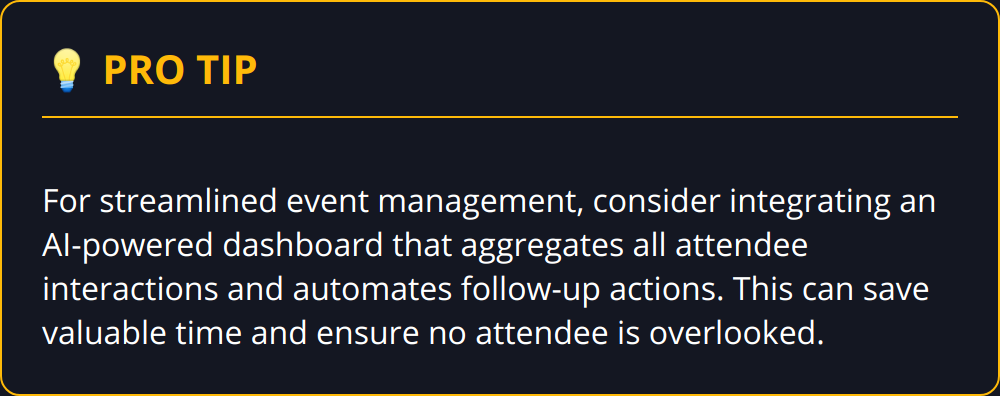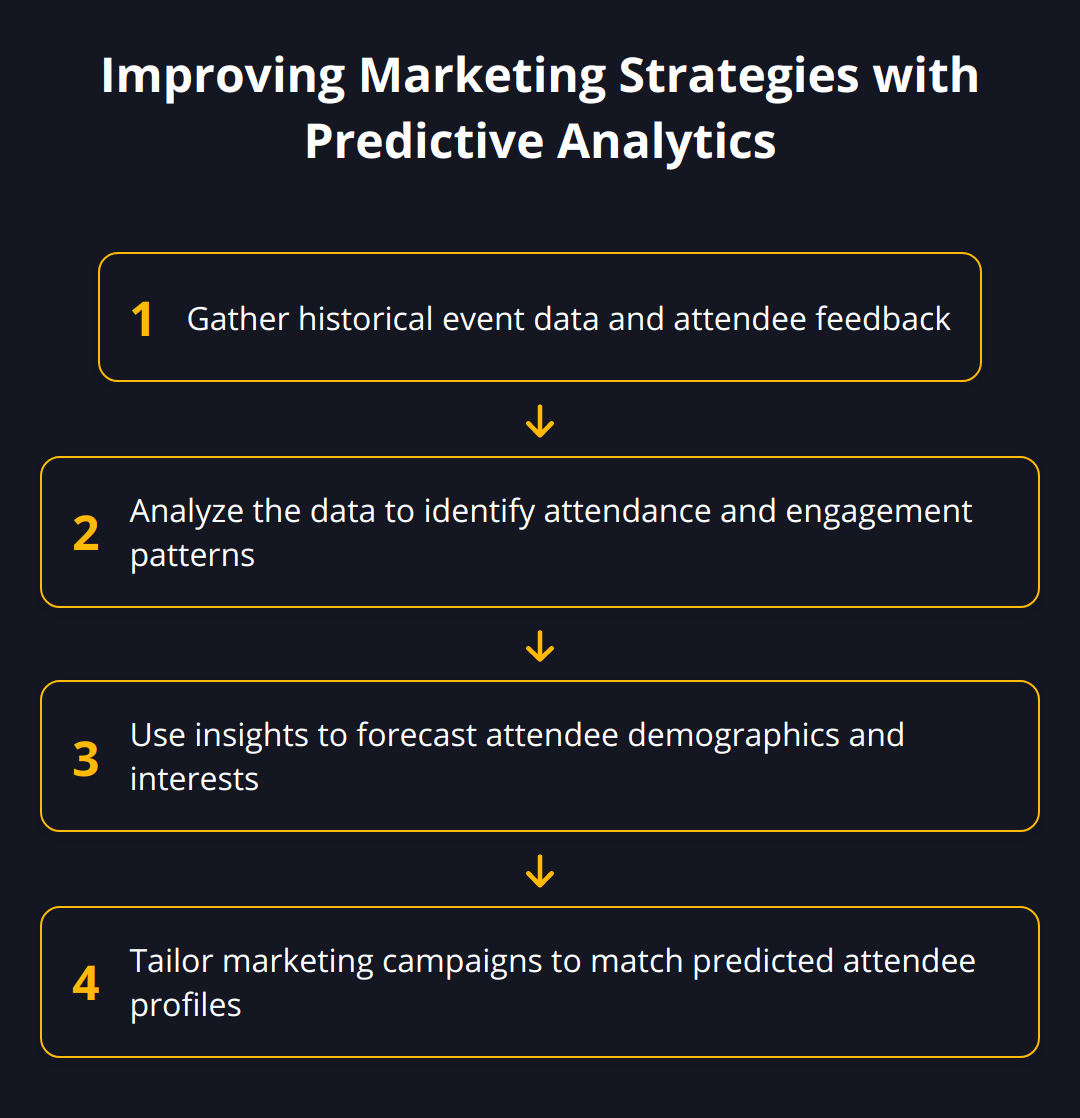Virtual events are swiftly evolving, and integrating artificial intelligence (AI) is transforming how we connect and engage from afar. We at newroom connect recognize that AI is not just a futuristic concept; it’s a practical tool that elevates the virtual event experience.
From personalized interactions to real-time insights, AI is enabling a more dynamic and responsive virtual environment. This post offers practical tips for implementing AI to not only enhance virtual events for participants but also streamline the management process behind the scenes.
Boosting Virtual Event Engagement with AI
Incorporating AI into virtual events has been a game-changer for participant engagement. The personalized touch that AI brings can make a large digital gathering feel like an intimate and tailored experience. For organizers looking to tap into this technology, here are some actionable strategies.
Elevate User Experience with Customization
First things first, it’s imperative to leverage AI for customizing the attendee experience. By analyzing past behavior, AI can suggest sessions, topics, or networking groups that align with individual interests. A tool like Bizzabo’s Event Experience Solution can track attendee preferences to generate personalized agendas, creating an event that speaks directly to each participant’s needs. This isn’t just a nice-to-have; it’s a strategic move that can significantly drive engagement rates up.
Practical Tips:
-
Implement AI-driven analytics to understand attendee behavior.
-
Use AI to curate personalized content recommendations.

Facilitate Networking through AI
Networking is the backbone of any event, and AI accelerates this by connecting like-minded individuals and organizations in a virtual ecosystem. Intelligent matchmaking algorithms can assess attendee profiles and behavior to suggest the most relevant connections. Integrating a platform such as Grip’s AI Matchmaking with your virtual event can result in higher quality leads, fruitful collaborations, and overall a more satisfying networking experience.
Actionables:
-
Integrate AI matchmaking tools to foster relevant connections.
-
Offer virtual breakout rooms based on AI suggestions to encourage discussions.
Measure Success with Real-Time Analytics
Finally, harnessing AI for real-time analytics lets organizers measure the pulse of the event instantly. AI can track engagement levels, participation rates, and even sentiment analysis during the event. Tools like GEVME’s Live Analytics provide these insights in real time, allowing organizers to adjust on the fly to maintain high engagement levels. Solid data helps pinpoint what works and what doesn’t, turning every event into a learning opportunity to perfect the next one.
Statistics That Matter:
-
Events leveraging real-time AI analytics reported a 30% increase in participant engagement.
-
Post-event data analysis leads to a 20% more efficient event planning for future instances.

Tips for Effective Analytics:
-
Include AI-powered polls and surveys for instant attendee feedback.
-
Set up real-time dashboards to monitor various engagement metrics.
By weaving these AI strategies into the fabric of your virtual event, you stand to not only heighten attendee satisfaction but also streamline the operational aspect, allowing your team to focus on delivering outstanding content and interactions.
Enhancing Event Management with AI
Artificial Intelligence is transforming event management by simplifying complex tasks and providing predictive insights. By leveraging AI, event planners can ensure a streamlined planning process and effective contingency management.
AI-Powered Task Automation
Event planning involves a myriad of tasks that can be time-consuming and repetitive. AI steps in as a time-saver by automating these routine activities. Automated registration systems not only speed up the check-in process but also provide a seamless experience for attendees. AI can also handle the distribution of event materials, automating email sequences, and updating schedules in real-time as sessions change. Chatbots, which can handle attendee queries, are another excellent example of task automation, quickly finding information on sessions, speaker details, and more.

Practical Tips:
-
Use chatbots to provide instant answers to common attendee questions.
-
Automate email communication with tailored updates and information.
Predictive Planning Precision
Next, predictive analysis is a powerful aspect of AI that can significantly improve event outcomes. By examining historical data and current trends, AI can forecast attendance and participation levels. This information is paramount when deciding on venue size, catering needs, and other logistical aspects. Additionally, predictive analytics assist in personalizing marketing efforts by identifying the most effective channels and messaging for reaching potential attendees.

Actionables:
-
Analyze past event data to predict future attendance and preferences.
-
Craft targeted marketing campaigns based on predictive insights.
Mastering Contingencies with AI
Lastly, when unexpected situations arise, AI-assisted tools provide efficient solutions. AI can analyze the likelihood of potential issues, like speaker cancellations or technical glitches, and suggest backup plans. This proactive approach enables event organizers to address challenges without disrupting the event flow. Moreover, AI can automatically reroute resources, adjusting logistical parameters in response to real-time feedback and changing circumstances.
To Remember:
-
AI can suggest backup speakers and sessions in case of last-minute changes.
-
AI tools can handle instant shifts in event logistics.
By incorporating AI into the event management process, every stage from planning to execution becomes more efficient, data-driven, and adaptable. This melding of technology and management is not just advantageous; it’s imperative for maintaining the dynamic pace of today’s virtual events.
A future chapter will continue to uncover the impactful role AI plays in the virtual event landscape.
Maximizing AI Data for Event Success
The real treasure trove of any virtual event lies in the rich data that’s collected throughout the attendee journey. By properly analyzing and utilizing this data, event planners can unlock insights that pave the way for more impactful and prosperous future events. Here, we’ll navigate through practical methods of generating value from AI-driven data insights to elevate the attendee experience and boost overall event success.
Data holds the power to transform good events into great ones. It’s crucial, therefore, to capitalize on the capabilities of AI to gather and interpret this information. One effective approach is to use AI to monitor attendee behavior during the event. This involves tracking which sessions are most attended, determining the dwell time at exhibitor booths, and understanding how participants interact with the content provided. Platforms like GEVME or 6Connex offer such solutions. By feeding this data back into the event planning process, organizers can make informed decisions about which topics resonate most and should be featured more prominently in the future.
Key Actionables to Understand Attendee Behavior:
-
Implement session tracking to see which talks are hits and which miss the mark.
-
Use heat maps to analyze footfall in virtual booths.
-
Observe networking activity to identify the most valuable connections made.
Once an event concludes, the critical task of post-event analysis begins. Surveying attendees is a fundamental step, but AI elevates this by swiftly escalating quantitative data with qualitative insights. The latter comes through technologies that can interpret open-ended feedback, giving a deeper understanding of attendee sentiments. This way, organizers are not only informed about what attendees did but also how they felt, which is a gold standard in refining future events.
Tips for Effective Post-Event Feedback Analysis:
-
Use AI to decipher free text responses for nuanced insights.
-
Correlate attendee satisfaction with specific event aspects.
-
Quickly identify common praise or complaints for rapid action.

Anticipating and setting trends is the mark of an industry leader. Data collected from events can be used to identify budding trends, whether it’s a surge in interest for certain event styles, such as hybrid events, or a growing demand for topics like sustainability. This forward-looking approach ensures that future events are in sync with market movements and attendee interests.
Strategies to Identify Trends for Future Events:
-
Apply data mining techniques to reveal hidden patterns among attendees.
-
Assess global participation to identify geographic or industry-specific interests.
-
Take note of evolving technology use, like augmented reality, within events to stay ahead.
By harnessing AI-driven data insights, event professionals can make calculated, strategic decisions that dramatically improve the virtual event offerings. Meticulously sifted data is pivotal in crafting an unmatched attendee experience that will set the bar high for future events. We push the envelope by turning data into decisions, ensuring that each event we manage is a testament to the prowess of informed planning.
Looking forward, the subsequent chapter will explore fresh perspectives on other AI-powered enhancements shaping the realm of virtual events.
Final Thoughts
Artificial intelligence has markedly reshaped the landscape of virtual events, bringing about a paradigm shift in attendee engagement and operational efficiency. Throughout our exploration, we’ve uncovered the multifaceted role AI plays in enriching user experiences, from offering bespoke content to facilitating meaningful connections. The ability to glean real-time analytics and predictive insights revolutionizes the way event success metrics are measured and interpreted, making data the cornerstone of strategic event enhancement.

Beyond these immediate benefits, the integration of AI signals a broader movement towards adaptive, responsive, and personalized virtual environments. Continuous learning emerges as a key theme; staying abreast of AI developments equips event organizers with the knowledge to harness its full potential. It’s vital to immerse oneself in the ongoing evolutions within AI to unlock innovative applications that will drive the virtual event industry forward.
Reflecting on the transformative power AI wields, it becomes apparent that embracing this technology is not an option but a strategic imperative for those who wish to lead in the digital realm. The future of virtual events will undeniably be shaped by AI’s evolving capabilities, fostering environments that are more connected, immersive, and insightful.
In alignment with this vision, we at newroom connect offer you a gateway to this future through our software platform. Our commitment to delivering an exceptional virtual presence is reflected in how we enable companies to create captivating virtual exhibitions and e-learning environments. With Unreal Engine 5 and Ready Player Me, newroom connect stands at the forefront of offering deeply immersive and personalized experiences that exceed expectations. We invite you to partner with us and redefine engagement, innovation, and outreach in your virtual events.
As the virtual landscape continues to expand and evolve, AI will remain an indispensable ally, guiding us through uncharted territories with precision and intelligence. The time to embrace AI and the boundless opportunities it presents is now. Join us on this journey, and together, let’s shape a future where every virtual interaction is impactful, memorable, and uniquely tailored to each participant.


